Mar
15
2012

Andrew Hong summarizes some ancient Confucian rites and their meanings, and then writes:
We don’t have many rituals in our modern world – but if you take that one simple ritual, and multiply that into every sphere of life, and every relationship, then you are coming close to the kind of society that Confucius sought to create through the rites. The rites become the means for society to go from inhumane behaviour (in the form of warfare during the Warring States period) to humane and dignified behaviour.
The rites were also the way for society to go from disordered relationships (in the form of rebellion) to ordered and reverential relationships… You may recall that there were five key relationships in the Confucianism: ruler-subject, father-son, husband-wife, older-younger, and friend-friend. These relationships were largely hierarchical in nature, and the rites gave people a way to express and reinforce those relationships.
This is what missiologist Paul Hiebert has to say about the importance of rituals,
“Modern people commonly regard rituals as harmless interludes or discount them as meaningless performances. But rituals play a central role in most societies. They are multilayered transactions in which speech and behaviour are socially prescribed. [...] They give visible expression to the deep cultural norms that order the way people think, feel, and evaluate their worlds. [...] Because rituals dramatise in visual form the deep beliefs, feelings, and values of a society, they are of particular importance in studying worldviews.” Paul Hiebert, Transforming Worldviews, 82-83.
Continue reading
Comments Off | tags: Baptism, China, Communion, Federal Vision, Ritual, Worship | posted in Christian Life, Quotes
Mar
7
2012
or Will Jesus Spit Us Out?
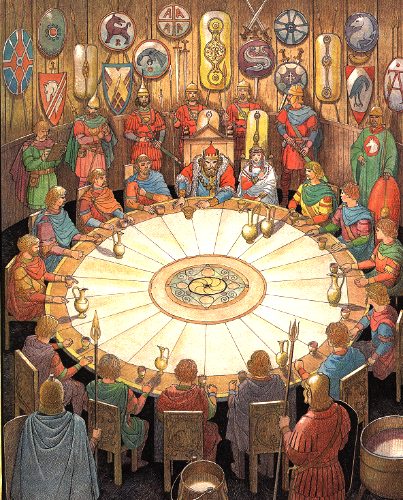
“But let a man examine himself, and so let him eat of the bread and drink of the cup. For he who eats and drinks in an unworthy manner eats and drinks judgment to himself, not discerning the Lord’s body. For this reason many are weak and sick among you, and many sleep.” (1 Cor. 11:28-30)
Some more detailed thoughts on what God is doing in the Lord’s Table. Part 1 here.
Covenant Renewal Worship follows the Bible Matrix. This means that our Christian worship recapitulates the Creation Week, the Feasts of Israel, and the journey from slavery to Sabbath (servants to sons), and the process of maturity, from childhood to adulthood. [1]
Continue reading
Comments Off | tags: Baptism, Communion, Corinthians, Covenant Theology, Federal Vision, Hebrews, James Jordan, Judas, Worship | posted in Biblical Theology, Christian Life, The Last Days
Mar
1
2012
or Knife and Fire
From Bible Matrix II: The Covenant Key.
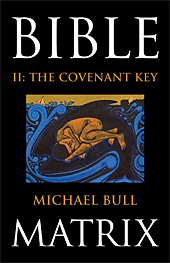 James Jordan observes that the tools required for Adam to produce bread and wine in the Land were “Knife and Fire.” In God’s kitchen, Knife is Division (guarding cherubim), and Fire is Testing (purifying seraphim). The ascension of the Head allows the holy fire to descend upon the nearbringing sacrifice and raise up a fragrant Body of smoke from the Altar.
James Jordan observes that the tools required for Adam to produce bread and wine in the Land were “Knife and Fire.” In God’s kitchen, Knife is Division (guarding cherubim), and Fire is Testing (purifying seraphim). The ascension of the Head allows the holy fire to descend upon the nearbringing sacrifice and raise up a fragrant Body of smoke from the Altar.
Continue reading
10 comments | tags: Communion, Covenant Theology, Genesis, Totus Christus, Typology | posted in Bible Matrix
Feb
16
2012
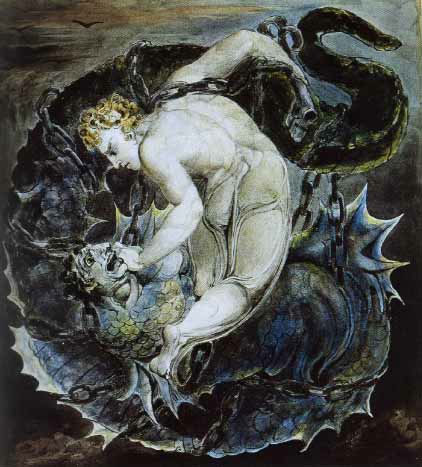
“No one can enter a strong man’s house and plunder his goods, unless he first binds the strong man. And then he will plunder his house.” (Mark 3:27 27)
A lot of commentary on the Revelation seems oblivious to the allusions to the Pentateuch (although there are many that do take it into account and are enlightening at the most obvious points). Even the “binding” of Satan in Revelation has an Old Testament background.
Continue reading
Comments Off | tags: AD70, Against Hyperpreterism, Communion, Millennium, Postmillennialism, Revelation 20, Totus Christus | posted in Bible Matrix, Biblical Theology, The Last Days
Feb
6
2012
or Ethnic Cleansing as Mercy

“In representative terms, the people of God are no longer the Land but the heavenly Sea. The Church herself is the oncoming storm.”
In The Days of Vengeance [PDF], David Chilton did a great job of introducing many of us to the fact of Jesus’ use of “cosmic language” in Matthew 24 to describe the end of the Old Covenant. Not only is the idea of an actual, physical star falling to earth impossible (can you imagine the sun “falling to earth”?) but Jesus is quoting from a prophecy against Babylon. His audience would have realized this as a scathing attack against the Herods and their “government controlled” Temple worship. So, the language is clearly poetic, but why would the prophets—and Jesus and His apostles—deliberately cause so much confusion by using cosmic language to describe non-cosmic events? The answer is found in the mercy of God.
Continue reading
3 comments | tags: AD70, Baptism, Circumcision, Communion, Postmillennialism, Tabernacle, Temple | posted in Against Hyperpreterism, Bible Matrix, Biblical Theology, The Last Days
Aug
8
2011

Doug Wilson writes: “In and through the sacraments, God winnows, divides, nourishes, establishes, and gloriously saves. He did this throughout the course of the OT narrative, and He is doing it now.” [1]
I agree with this statement entirely, except that the New Covenant body is entirely “priestly.” The Table is not primary education, but secondary. It is not the preaching of the gospel to the unconverted, but the memorial of it by the converted.
Continue reading
6 comments | tags: Baptism, Communion, Covenant Theology, Doug Wilson | posted in Bible Matrix, Biblical Theology, Quotes
Jul
30
2011

“If the Federal Vision got baptism right, they would be demonstrating the biblical dominion pattern in every individual’s life.”
Matt Caslow posted some thinking man’s questions concerning Bully’s broadband brand of credobaptism. Matt, I hope these answers help you understand my assertions. Happy to discuss further. I’ll soon be posting a page at the top of the blog with baptism links.
Continue reading
16 comments | tags: Acts, Baptism, Communion, Doug Wilson, Federal Vision | posted in Bible Matrix, Biblical Theology
Jun
27
2011

How can we fix modern worship? Nearly all debate on this subject overlooks what the Bible has to say.
In From Silence to Song, Peter Leithart justifies the practice of finding patterns for our worship in the Levitical rites in the fact that King David did precisely this.
“…sacrificial worship did not cease with the coming of the New Covenant, but was transformed into a “spiritual sacrifice” and “sacrifice of praise.” We now do different things than ancient Israelites did, but those actions have the same meaning as the actions in the Levitical ceremonies.
Continue reading
2 comments | tags: Chronicles, Communion, David, Leviticus, Liturgy, Peter Leithart, Typology, Worship | posted in Biblical Theology, Quotes
Jun
24
2011
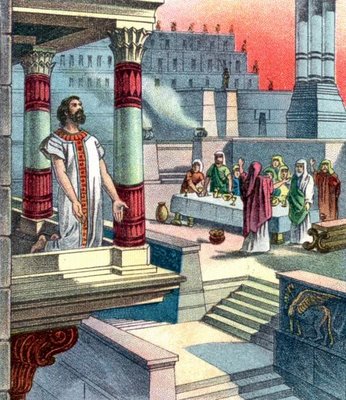
Another gem from Tim Nichols:
Consider Daniel 9, the prayer of the just man Daniel. Go ahead and read it; I’ll wait.
Did you notice that Daniel identifies fully with his people? “We have not obeyed the voice of the Lord our God, to walk in His laws,” he says — although Daniel himself did, in fact, keep them. “We have not made our prayer before the Lord our God” — although Daniel did so daily, even at risk of his life. “Neither have we heeded your servants the prophets,” he says — although he himself was a close student of the prophets, especially Jeremiah.
Continue reading
Comments Off | tags: Communion, Confession, Daniel, Habakkuk, Isaiah, Jeremiah, Judgment, Tim Nichols | posted in Biblical Theology, Christian Life, Quotes
Jun
20
2011
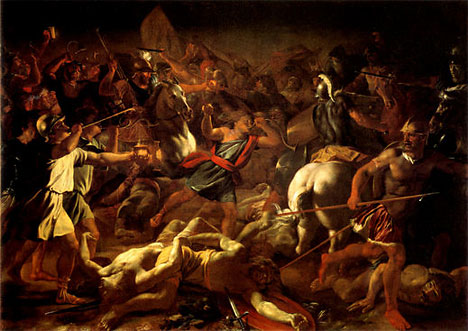
What do the Psalms mean when they speak of the Lord “bowing the heavens”?
“Bow thy heavens, O Lord, and come down: touch the mountains, and they shall smoke.” (Psalm 144:5)
“He bowed the heavens and came down; thick darkness was under his feet.” (Psalm 18:9)
The language is architectural, based on the original and greatest Temple of them all, the cosmic “house” constructed in Genesis 1.
This post has been slain and resurrected for inclusion in my 2015 book of essays, Inquietude.
Continue reading
13 comments | tags: Baptism, Communion, Covenant curse, Covenant Theology, Crystal Sea, Exodus, John Barach, Revelation, Sinai, Tabernacle | posted in Bible Matrix, Biblical Theology



































